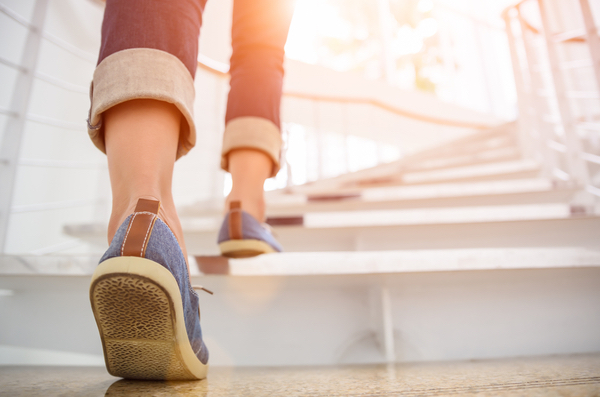Never mind the latest fancy fitness fads. Climbing the stairs is the easy, accessible and budget-friendly way to burn calories, reduce blood pressure and even lower your brain age.
You don’t need an expensive gym membership or even a decent pair of trainers to get fit. It turns out that the perfect tool for total body and mind health was staring us in the face the whole time (or rather, ‘stairing’). Climbing the stairs at home, work or out and about is one of the simplest, most effective ways to give your heart, brain and muscles a boost. Here’s why.
A way to lose weight
Stair climbing burns 8-11 calories per minute and adding in two flights daily can lead to 6lbs of weight loss over just one year, according to a US study. And no wonder – it’s twice as taxing as a brisk walk, according to Harvard research, and 50 per cent more challenging than walking up a steep incline.
‘Stair climbing is a great calorie burner. It’s a combination of cardio and strength training which will tone and build stamina,’ says personal trainer Becks Boston (becksacefitness.com). ‘Add ankle weights to increase the effort and hold a pair of light dumbbells for extra resistance and this will improve your core stability which will
tone your stomach muscles and help your posture.’
Improved heart health
Another reason to step up – researchers from Canada revealed that stair climbing increases cardiovascular fitness. The even better news is that, while previous studies have found similar results based on prolonged stair climbing, this research found short, sharp bursts could yield similar results.
Participants climbed vigorously up and down one flight for 60 seconds, totalling 30 minutes a week – an exercise that’s really easy to replicate at home or work. This heart health benefit could be why stair climbing has been linked with living a longer life. The Harvard Alumni Study found that men who climb eight flights of stairs a day on average have a 33 per cent lower mortality rate than men who are inactive – even higher than those who walk 1.3 miles a day.
While Step Aerobics used to be all the rage, it’s less common to find classes at the gym. Luckily YouTube has stepped in – you’ll find lots of free step sessions including some made by Reebok that will get your heart pumping.
Magic for menopause
Going through menopause can cause a reduction in your muscle strength as oestrogen levels decrease. But researchers from the North American Menopause Society discovered that stair climbing is great for building leg strength – especially in postmenopausal women.
The same research also demonstrated it can lower blood pressure and reduce your risk of osteoporosis. Participants trained for four days a week, climbing 192 steps between two and five times each day – get the same effect with a visit to Whitby’s famed 199 steps!
 It’s not all about going up…
It’s not all about going up…
Walking back down the stairs has its own set of unique benefits. It’s a form of eccentric exercise, which means placing a load on a muscle when it’s lengthening, rather than shortening (as happens on the way up).
Going downstairs was found to reduce the risk of diabetes in a group of obese women in an Australian study, lowering their resting levels of insulin and glucose as well as increasing their levels of good cholesterol.
Raise your energy
When flagging, you might be tempted to reach for a caffeinated drink, but there’s a simple, natural alternative. Yes, you guessed it – going up and down the stairs! Just 10 minutes of this was found to make people feel more energised than drinking 50 milligrams of coffee, according to an American study. The remedy is now being recommended for sluggish office workers.
For more motivation to take the stairs at work, visit StepJockey (stepjockey.com) where you’ll find an app to make stair climbing at work into a game, and organised charity stair climbing eventsto take part in.
Good for your brain
While getting your steps in is obviously good for your body, there’s evidence it’s also great for your grey matter. In fact, the more stairs you climb, the younger your brain appears to get, according to a Canadian study. Researchers found that people’s brain age decreased by 0.58 years for every daily flight of stairs they climbed. This was found by measuring their grey matter through MRI scanners.
 Get your steps
Get your steps
When you aim for a certain number of stairs a day, you’ll start seeing them everywhere! Avoid escalators and lifts in shops and stations and use the toilets or coffee machine on different floors of your workplace. Make a day trip of it – Southwold Lighthouse in Suffolk has 113 steps, St Paul’s Cathedral in London has 528, and Blackpool Tower has a whopping 1,036!
Need motivation?
Sign up for a Tower Run (towerrunninguk.com), a bit like a normal race but – you guessed it – climbing a tower or landmark.








